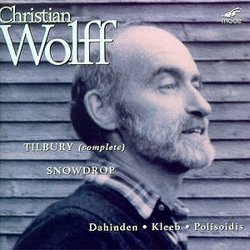Austere Yet Pleasing
Christopher Forbes | Brooklyn,, NY | 01/30/2003
(5 out of 5 stars)
"With the recent passing of Earle Brown, Christian Wolff is now the sole remaining composer left amoung us from the highly influential New York School of the 50's. Mode has undertaken a series of recordings aimed at exploring the work of this intriguing composer. While the result have been of varied quality, this release is some of the best music that Wolff or Mode has ever put out.Wolff's Tilbury pieces are a product of the late 60s. Wolff had steadily developed his interest in static processes throughout the decade, experimenting with text scores, graphic scores, indeterminate elements and strict mathematical processes to create works of minimal and austere beauty. The Tilbury works I-IV and Snowdrop are perhaps the crowning achievement in this phase of the composer's career. Tilbury I restricts the tonal palette to a few notes that are within the range of an octave. It is scored for open ensemble, though Wolff said that all the Tilbury pieces were vaguely planned for keyboard with other instruments optional. This trio chooses to use violin or viola, trombone or melodica and piano. The resultant piece is calm and highly meditative, resembling nothing so much as a shorter version of late Feldman. Tilbury II uses notes that contrast widely in range and with a greater rhythmic variety. Tilbury III is based on arpegiated triads, with the rhythmic process determined by the ratios of the orbit of the planetary system. Tilbury IV is a text piece, dominated by varying scale fragments and long sustained notes. This is perhaps the lovliest thing on the disc and is played exquisitely. Snowdrop is related in process to the Tilbury series, based on the scale patterns of Tilbury IV and the rhythmic processes of Tilbury III. Tilbury V was written in the early 90s many years after the rest of the series. It shows more of the late Wolff style. The melodic material is based on a political song by Hans Eisler which is subjected to algorithmic treatments, creating something that on the surface sounds more traditional, but is ultimately as process driven as his earlier music. As always, Mode has assembled a very fine ensemble to interpret this music and has packaged it with intelligent liner notes from the composer himself. This is a marvelous introduction to this marvelous composer."


 Track Listings (6) - Disc #1
Track Listings (6) - Disc #1